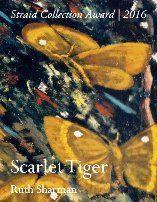Wendy Klein finds Ruth Sharman’s poetry collection hard to put down
Scarlet Tiger by Ruth Sharman Templar Poetry ISBN 9 781911 132103 94 pp £10
Actually starting to write this review has been the ultimate challenge. Starting to write it meant ceasing to read it, and I have seldom been so reluctant to put a book down. Like Penelope tirelessly unpicking the day’s weaving each night, I have had to cross out my notes each time to begin again. To read this book, is to reach the end and to be filled with the desire to go back to the beginning and start all over.
If it wasn’t the perfection of language laced through with feeling, evident from the first poem ‘By heart’ about the poet’s dying father, a lepidopterist:
I want you to remind me what was special about the hairstreak with the W scrawled in white across its underwing – as if knowing cancelled absence and a father could be hoarded piecemeal with the facts –
it was the freshness of the imagery in ‘Evening’:
That bush, for instance, a barberry with flowers so orange they’re ready to ignite,
Then suddenly an astonishing sestina, a form that locks a poet into six end words in a specific order and too often ends up with strained repetition. ‘Morphine’ takes the six words: sleeping, life, nothing, over, light, shadows, into a death-bed scene which allows for persuasive, almost incantatory repetition as the poet wishes for her dying father to be set free of his life
…to dream you’re back amongst the shadows watching your evening browns flying in the last light on India’s southern tip. Then nothing, no enemy, no butterflies, as you slip away, still sleeping.
She wisely shies away from the cramping final tercet, which requires the poet to use the six chosen words two to a line in the strict order, which the rules prescribe. Instead she allows the piece to end naturally with a final six-line stanza.
The received wisdom of contemporary poetry suggests metaphor is always stronger than simile. Sharman challenges this message again and again. In ‘Curtains’, her baby son sleeps:
as serene as the Buddha contemplating a circle of water beyond his window…
and as an older child, the image reappears in ‘Samsara’:
wrapped in a towel and reading under the light, so still he could be a golden Buddha in some temple eyrie,
and even more perfectly in the title poem where the Scarlet Tiger moth, observed by father and daughter:
… scuttled out of the leaves and grass, climbed our stick and hung there, like a zippered bag crammed with too many t-shirts,
After reading and re-reading I was left with a sense that I would trust this poet with almost any topic. Although it is impossible not to be struck again and again by the detail of the moth and butterfly world she experienced through her father, she is as at home in other nature settings as she is in relationship and ekphrasis. In ‘Phugtal’ she writes of a Himalyan mountain, its perils similar to the path of relationship:
all things seem possible, even the high path the guide books warn against, strewn with scree and shifting as the course of marriage.
In ‘The studio chair’ (after a painting by Sara Lee Roberts) she avoids both the too-easy drawback of description that tends to dominate much ekphrastic poetry. She begins:
Take away the chair and we’re left with abstraction
creating a world of the chair itself
... stranded in a pool of light from an unseen window, … as if the stillness concealed some invisible presence and sunshine itself were the sitter.
It is here that the poem itself metamorphoses into the object, becoming a piece of art, separate and distinct, achieved with a magician’s touch of huge subtlety.
Reading Scarlet Tiger I have learned how much harder it is to write a review of a book the reviewer has truly loved. There is no space for the “what worked well” and “what worked less well” when a poet is as convincingly skilful and such a remarkable wordsmith as Ruth Sharman. Reading her poems is like being drawn into a cocoon which may be delicious, dangerous, or heart-breaking, but the experience is so compelling the reader cannot pull back, nor wish to do so.


